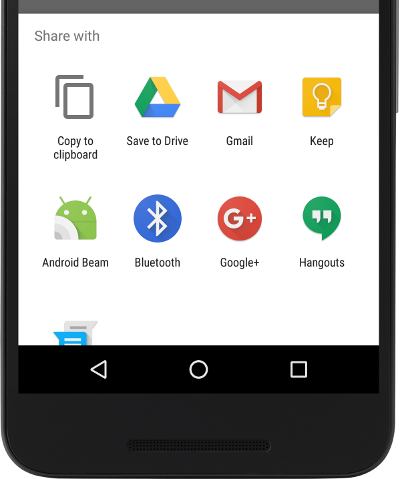Use Case
A common use case when building an Android app is to have it handle data shared from other apps. All Android users know this little dialog that pops up when you hit the “Share” button in any app. It displays a list of applications, which are registered for receiving shared data. The user has to choose one, which is then opened up to handle the shared text, URL or whatever it is. On iOS, a similar concept exists. However, this article focused on Android only.

(Source: https://cketti.de/)
As an example, let’s imagine having a bookmark-manager written in Flutter. It is supposed to save URLs with their accompanying titles, shared from the smartphone’s browser to the app, to one of your bookmark collection. This is exactly what I just build.
Background
The official Flutter docs already give a good example on how to achieve that functionality. However, I found that their piece of code only works, if you share data to an app that is still closed. If you had opened your app before and it idles in the background, it won’t receive the sharing intent when it is resumed. Therefore, I extended the example.
Code
AndroidManifest.xml
First, you have to add an intent-filter to your AndroidManifest.xml in the android/ directory to register your app as a sharing target.
1 | ... |
MainActivity.java
Secondly, you will need to add some code to MainActivity.java (analogously for Kotlin projects). In the onCreate() lifecycle hook, you have to register a MethodCallHandler() to act as an interface between the underlying Android app and your flutter code. In addition, you have to override the onNewIntent() callback, which is triggered when a new sharing intent (Intent.ACTION_SEND) causes your app to change its lifecycle state. Lastly, you need a method to handle the actual content shared from the external app. It consists of two fields, a URL and a title, both represented as strings in a Map. In the end, your MainActivity looks like something like this.
1 | private Map<String, String> sharedData = new HashMap(); |
Note that the shared data is “cached” on the Java side of your app until is it picked up by your Flutter code.
Your Flutter app
Eventually, you need to add a method to your Flutter code to interact with the native-Android MethodHandler. It will be called once during state initialization and – with the help of a listener – every time the underlying Android activity is resumed.
1 | class SampleAppPage extends StatefulWidget { |
Now you’re good to go! Once you extracted the sharing intent’s contents, you can, for instance, show a pre-filled dialog to add the new link to one of your bookmark collections, just as I did here.
Conclusion
This approach might seem a little complicated, but in fact, it is the only working solution I could find. There is a plugin called flutter-share, but unfortunately it did not work for me. Happy coding 😉!
Comments